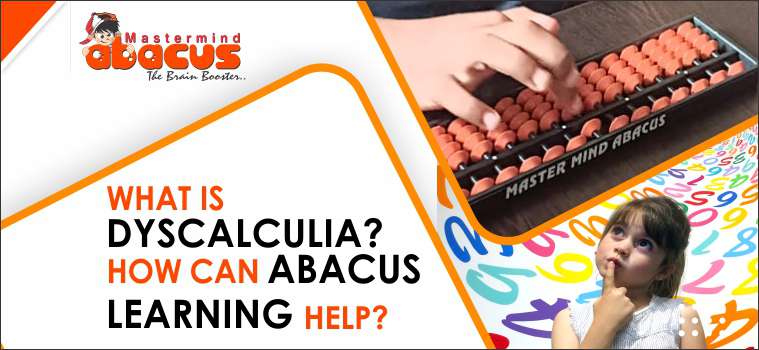
What Is Dyscalculia? How Can Abacus Learning Help?
Does your child struggle in Math? Has serious issues with basic Math concepts like recognizing numbers, counting, estimating or telling time, etc. Just check, maybe the child is a case of 'Dyscalculia'.
In this write-up, we will discuss what is Dyscalculia. And how can Abacus learning help? To reach an understanding of Dyscalculia we will answer the following related questions:
1. What is Dyscalculia?
2. How common is it?
3. Are all math difficulties caused by Dyscalculia?
4. Recognizing/ Diagnosing Dyscalculia
5. Treating Dyscalculia
6. How Parents Can Help
What Is Dyscalculia?
Dyscalculia is a specific learning disability. This term is used when a student has difficulties in learning basic math concepts and performing number-related operations.
The Math skills of such children usually have below-average math skills.
How common is it?
Studies have shown that Dyscalculia is seen in 3% to 7% of children. It is seen in an equal ratio in both genders.
Are all math-related difficulties caused by Dyscalculia?
No. Not necessarily. Other learning disorders can also contribute to poor performance in the Math learning abilities of a child.
Some children perform very well in other subjects, but still, they may be suffering from Dyscalculia.
Recognizing/ Diagnosing Dyscalculia
Many of the children show signs of anxiety the moment you expose them to numbers. They fear math, as they are unable to understand the processes involved in performing anything related to numbers.
The symptoms start to surface in early school days. They may have problems recognizing numbers, counting, etc. They require more time to solve any math problem compared to the other kids in the class. But in a normal learning ability child, this should improve with time.
If the problem persists and the child does not show signs of improvement, we can conclude it is Dyscalculia.
Parents can contribute to diagnosing Dyscalculia, in the early years of the child. This can be of great help in overcoming the problem. Thankfully it is curable.
So, what should you look for?
Look for the following symptoms:
Early Symptoms:
A) See if the child gets confused while recognizing numbers
B) Always take external support (using fingers) while counting.
C) Is slow in learning to count.
D) The child cannot always correctly connect the word with their numerical, like 3 with three.
E) Patterns confuse the child, and cannot put things in order.
F) Cannot perform Mental Math, always loses links.
Symptoms as the children grow:
a) Learn basic math functions like addition and subtraction with great difficulty.
b) It is not easy for them to understand non-numerical math problems as the concepts are difficult for them to understand.
c) Math Home assignments and tests are a real challenge for them.
d) They are at a loss when asked to estimate the tentative time required to complete a certain task.
e) As they grow they cannot understand spatial ideas like graphs and charts
Symptoms beyond the school:
a) Cannot remember phone numbers, scores, zip codes, etc.
b) Cannot estimate the distance from one point to the other or the travel time required.
c) Have a mix-up when it comes left and right or even recalling directions.
Cannot read the clock correctly.
d) Get confused about calculating cost when at a shop and often cannot calculate the amount of change to be received back.
e) Usually, avoid games that involve calculations like constantly maintaining and remembering the score.
The basic symptoms are the inability to learn and do basic math like addition, and subtraction, recalling math facts like tables, and formulae, performing mental math or showing poor problem-solving skills.
Parents can identify a child struggling with Dyscalculia, but the teacher is expected to assure this if a child is having consistent problems with his/her Math lessons.
A teacher should not conclude that a child does not like Math or has Math anxiety. It may be a case of Dyscalculia. If the teacher fails to identify, it is advisable to contact a Psychologist.
Dyscalculia is often hereditary. These children also exhibit other learning disabilities Dyslexia or ADHD.
Treating Dyscalculia
1. The Role of Parents- Parents Have A Lot To Contribute, and They Can Prove To Be of Great Help.
A. Create a Positive Environment and Motivate
The child should be made to believe that they can perform in math. That it is easy, and they will become perfect with practice. Award them for their smallest achievement.
B. Encourage External Aids
Encourage the use of external help that can promote visualization of numbers and ease their manipulation and understanding of the arithmetic problems. The external aids can be an Abacus Tool, cubes, calculator, etc.
C. Focus One At A Time
Parents must help the child with their math homework. Make it simple. Train the child to focus on one sum at one time. They can do this by writing one question on a separate sheet and not worrying about the others. This helps in reducing the mental pressure of the workload.
D. Make Math A Practical Activity
You can link numbers to daily activities in your home, and play board games like ludo, snake & ladder. Basic arithmetic operations, like addition and subtraction, can be practiced with the stuff in your kitchen. Over a period this reduces the fear of numbers in the children.
2. Role of School and External Aids
A. Role of School
As the first step, the math teacher must identify if a child is suffering from Dyscalculia. Once done, they can plan out differential learning plans for them, like additional time or extra class as we call it, allowing a little extra time in tests. Appreciate them in the class for doing things right etc. The Math teacher must regularly communicate with parents about a child's progress and guide them on the dos and don't s.
B. Role of External Aids Like Calculators & Abacus
Calculator -While a calculator can reduce the stress of calculations, it may not be of great help in understanding the concept.
Abacus Training- Abacus training adds a lot of confidence to the Mental Math abilities of children with Dyscalculia. The use of an Abacus tool transforms the abstract nature of numbers into tangible objects with identifiable value. It is of great help to a child as it reduces the stress on the working memory and thus helps in retaining more information. It helps in developing and using working memory. Moreover, it has been scientifically proven that the process involved in Abacus learning triggers whole brain development, enhances concentration, improves listening ability, and visualization ability improves recall of math facts and enhances memory. They can perform Mental Math with speed, accuracy, and confidence. All of these help children with Dyscalculia to perform better at Math and overcome math phobia. Mastermind has over 2000 centers operating Abacus Classes globally. Inquire now to find an Abacus class in your vicinity.
Modern-day Abacus training is not limited to the use of an ancient Abacus tool only. It has gone hi-tech with the introduction of Abacus-based math video games. These games are designed to be not only highly engaging, but they are also competitive and encouraging as they come with marks and awards for every right answer and most importantly follow the calculation method of the ancient Abacus Math. Mastermind’s Abacus E-learning Platform has made Abacus accessible across the world, with no more geographical boundaries. Book a free Demo.
Training at Abacus classes through all levels is seen to improve in the children struggling with Dyscalculia. It improves their computation skills, Mental Math ability, and logical reasoning capacity.
The most important thing is that Dyscalculia is treatable. There is nothing to panic about. Never forget motivating the child is the key to success.
Also Read: Abacus - Why should we use both hands to operate it?





